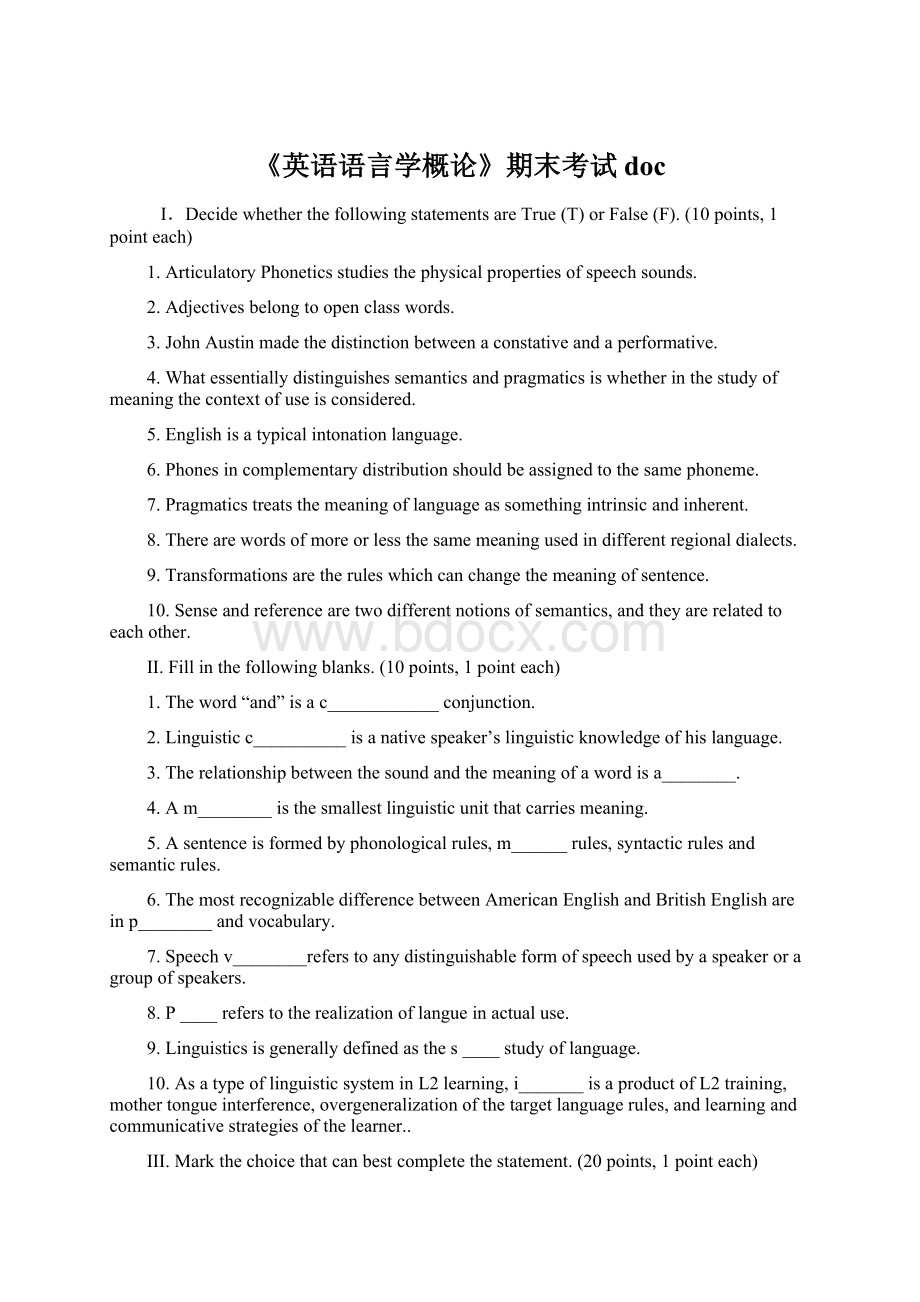《英语语言学概论》期末考试doc.docx
《《英语语言学概论》期末考试doc.docx》由会员分享,可在线阅读,更多相关《《英语语言学概论》期末考试doc.docx(7页珍藏版)》请在冰豆网上搜索。

《英语语言学概论》期末考试doc
I.DecidewhetherthefollowingstatementsareTrue(T)orFalse(F).(10points,1pointeach)
1.ArticulatoryPhoneticsstudiesthephysicalpropertiesofspeechsounds.
2.Adjectivesbelongtoopenclasswords.
3.JohnAustinmadethedistinctionbetweenaconstativeandaperformative.
4.Whatessentiallydistinguishessemanticsandpragmaticsiswhetherinthestudyofmeaningthecontextofuseisconsidered.
5.Englishisatypicalintonationlanguage.
6.Phonesincomplementarydistributionshouldbeassignedtothesamephoneme.
7.Pragmaticstreatsthemeaningoflanguageassomethingintrinsicandinherent.
8.Therearewordsofmoreorlessthesamemeaningusedindifferentregionaldialects.
9.Transformationsaretheruleswhichcanchangethemeaningofsentence.
10.Senseandreferencearetwodifferentnotionsofsemantics,andtheyarerelatedtoeachother.
II.Fillinthefollowingblanks.(10points,1pointeach)
1.Theword“and”isac____________conjunction.
2.Linguisticc__________isanativespeaker’slinguisticknowledgeofhislanguage.
3.Therelationshipbetweenthesoundandthemeaningofawordisa________.
4.Am________isthesmallestlinguisticunitthatcarriesmeaning.
5.Asentenceisformedbyphonologicalrules,m______rules,syntacticrulesandsemanticrules.
6.ThemostrecognizabledifferencebetweenAmericanEnglishandBritishEnglishareinp________andvocabulary.
7.Speechv________referstoanydistinguishableformofspeechusedbyaspeakeroragroupofspeakers.
8.P____referstotherealizationoflangueinactualuse.
9.Linguisticsisgenerallydefinedasthes____studyoflanguage.
10.AsatypeoflinguisticsysteminL2learning,i_______isaproductofL2training,mothertongueinterference,overgeneralizationofthetargetlanguagerules,andlearningandcommunicativestrategiesofthelearner..
III.Markthechoicethatcanbestcompletethestatement.(20points,1pointeach)
1.Whichofthefollowingbranchoflinguisticstakestheinnerstructureofwordasitsmainobjectofstudy?
A.Phonetics.B.Semantics.C.Morphology.D.Sociolinguistics.
2.________referstoamarginallanguageoffewlexicalitemsandstraightforwardgrammaticalrules,usedasamediumofcommunication.
A.DialectB.IdiolectC.PidginD.Register
3.Whichofthefollowingisavoicelessbilabialstop?
A.[w].B.[m].C.[b].D.[p].
4.Thephenomenonthatwordshavingdifferentmeaningshavethesameformiscalled________.
A.hyponymyB.synonymyC.polysemyD.homonymy
5.WhichofthefollowingwordsisNOTformedbyblending?
A.Smog.B.Botel.C.Brunch.D.Edit.
6.Whatphoneticfeaturedistinguishesthe[p]inpleaseandthe[p]inspeak?
A.VoicingB.AspirationC.RoundnessD.Nasality
7.Thewordboyguardisa______.
A.compoundwordB.complexword
C.derivationalwordD.freemorpheme
8.Allwordscontaina_________.
A.rootB.boundmorphemeC.prefixD.suffix
9.Ofthefollowingsoundcombinations,only______ispermissible.
A.kiblB.hkilC.ilkbD.ilbk
10.Whereistheprimarystressofthewordphonology?
A.pho.B.no.C.lo.D.gy.
11.Conventionallya________isputinslashes.
A.allophoneB.phoneC.phonemeD.morpheme
12.Thepluralaffixinthewordtablesisa(n)_______.
A.inflectionalsuffixB.derivationalsuffix
C.freemorphemeD.root
13.Languageistoolofcommunication.Thesymbol“highwayclosed”serves___.
A.anexpressivefunctionB.aninformativefunction
C.aperformativefunctionD.apersuasivefunction
14.Whichofthefollowinggroupsofwordsisaminimalpair?
A.but/pubB.wet/whichC.cool/curlD.fail/find
15.Whorfbelievedthatspeakersofdifferentlanguagesperceiveandexperiencedtheworlddifferently,thatisrelativetotheirlinguisticbackground,hencethenotionof______________.
A.linguisticdeterminationB.linguisticrelativism
C.linguisticnativismD.linguisticbehaviorism
16.Whatarethedualstructuresoflanguage?
A.Soundsandletters.B.Soundsandmeaning.
C.Lettersandmeaning.D.Soundsandsymbols.
17.Themeaningcarriedbytheinflectionalmorphemeis_______.
A.lexical B.morphemic
C.grammatical D.semantic
18.AccordingtoKrashen______referstothegradualandsubconsciousdevelopmentofabilityinthefirstlanguagebyusingitnaturallyindailycommunication.
A.learningB.competenceC.performanceD.acquisition
19.Whichofthefollowingisoneofthecorebranchesoflinguistics?
A.Phonology.B.Psycho-linguistics.
C.Sociolinguistics.D.Anthropology.
20.Therelationshipbetween“flower”and“tulip”is_________.
A.homonymyB.hyponymyC.polysemyD.synonymy
IV.Translatethefollowinglinguisticterms:
(10points,1pointeach)
A.FromEnglishtoChineseB.FromChinesetoEnglish
1.acousticphonetics6.应用语言学
2.closedclasswords7.格语法
3.componentialanalysis8.积极迁移
4.distinctivefeatures9.历史语言学
5.CriticalPeriodHypothesis10.声调语言
V.DrawatreediagramforthefollowingsentencebyapplyingTGGrammar.(10points)
Themansawahorse.
VI.Answerthefollowingquestionsbriefly.(20points)
1.Definephoneme.(4points)
2.Explaincomplementarydistributionwithanexample.(5points)
3.WhatarethefourcriteriaforclassifyingEnglishvowels.(4points)
4.AnalyzethefollowingconversationbyapplyingtheCooperativePrinciples.(7points)
A:
TeheranisinTurkey,isn’tit,teacher?
B:
AndLondonisinFrance,Isuppose.
VII.Dothefollowinganalysis.(20points)
1.WritetheoneproperdescriptionfromthelistunderBfortheunderlinedpartofeachwordinA.(5points,1pointeach)
AB
(1)terrorizeda.freeroot
(2)uncivilizedb.boundroot
(3)terrorizec.inflectionalsuffix
(4)lukewarmd.derivationalsuffix
(5)impossiblee.inflectionalprefix
f.derivationalprefix
2.ConsiderthefollowingsentencesinSwahili,andanwerthequestions:
(15points)
mtuamelalaThemanhasslept.
mtuanalalaThemanissleeping.
mtuatalalaThemanwillsleep.
watuwamelalaThemenhaveslept.
watuwanalalaThemenaresleeping.
watuwatalalaThemenwillsleep.
visuvinaangukaTheknivesarefalling.
kikapukimeangukaThebaskethasfallen.
watotowatafikaThechildrenwillarrive.
1)totoinSwahilimeans______inEnglish.
2)Themeaningofthemorphemewa-inSwahiliis_______.
3)______inSwahilimeans“sleep”inEnglish.
4)TranslatemtotoanaangukaintoEnglish.
5)TranslatevikapuvimefikaintoEnglish.
台州学院_____学年第___学期
___级____专业《英语语言学概论》期末试卷A卷(闭卷)
参考答案及评分说明
I.DecidewhetherthefollowingstatementsareTrue(T)orFalse(F).(10points,1pointeach)
1
2
3
4
5
6
7
8
9
10
F
T
T
T
T
F
F
T
F
T
II.Fillinthefollowingblanks.(10points,1pointeach)
1.coordinate2.competence3.arbitrary4.morpheme5.morphological
6.pronunciation7.variety8.performance9.scientific10.interlanguage
III.Markthechoicethatcanbestcompletethestatement.(20points,1pointeach)
1
2
3
4
5
6
7
8
9
10
11
12
13
14
15
16
17
18
19
20
C
C
D
D
D
B
A
A
A
B
C
A
B
C
B
B
C
D
A
B
IV.Translatethefollowinglinguisticterms:
(10points,1pointeach)
1.声学语音学6.appliedlinguistics
2.封闭词类7.casegrammar
3.成分分析8.positivetransfer
4.区别性特征9.historicallinguistics
5.临界期假说10.tonelanguage
V.DrawatreediagramforthesentencebyapplyingTGGrammar.(10points)
S
NPInflVP
DetNpstVNP
DetN
themansawahorse
VI.Answerthefollowingquestions.(20points)
1.Acontrastivephonologicalsegmentwhosephoneticrealizationsarepredictablebyrules.(4points)(or:
Aphonemeisaphonologicalunit;itisaunitthatisofdistinctivevalue.)
2.Thesituationinwhichphonesneveroccurinthesamephoneticenvironment.(4points)e.g.[p]and[ph]neveroccurinthesameposition.(1point)
3.thepositionofthetongueinthemouth(1point),theopennessofthemouth(1point),theshapeofthelips(1point),andthelengthofthevowels.(1point)
4.AccordingtotheCooperativePrinciple,theparticipantsoftheconversationshould
obeythefourmaximsoftheprinciple:
themaximofquantity,themaximofquality,themaximofrelation,themaximofmanner.(2points)Inthisconversation,B’sreplydeliberatelyviolatedthemaximofquality,(2points)becauseBwantedAtoinfertheinformationthatTeheranisnotinTurkey.ThemainpurposeofBistoletAknowthatitisabsurdtomakesuchamistake.(3points)
VII.Dothefollowinganalysis.(20points)
1.
(1)c
(2)a(3)d(4)b(5)f(1pointeach)
2.1)child(2points)2)human,plural(3points)3)lala(2points)4)Thechildisfalling.(4points)5)Thebasketshavearrived.(4points)
感谢下载!
欢迎您的下载,资料仅供参考
感谢下载!
欢迎您的下载,资料仅供参考